Aim:
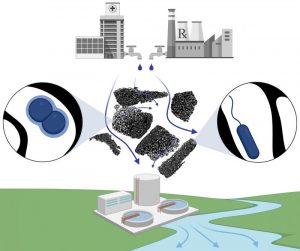 The Biochars for Pollution Prevention Working Group aims to foster knowledge exchange and pathways to impact for academics working on state-of-the-art technologies related to the use of biochar for pollution prevention and environmental remediation – particularly as applied to microorganisms. This can be either in terms of removing, killing or preventing release of harmful microorganisms, or in terms of seeding bioremediative microorganisms for the purpose of pollutant degradation.
The Biochars for Pollution Prevention Working Group aims to foster knowledge exchange and pathways to impact for academics working on state-of-the-art technologies related to the use of biochar for pollution prevention and environmental remediation – particularly as applied to microorganisms. This can be either in terms of removing, killing or preventing release of harmful microorganisms, or in terms of seeding bioremediative microorganisms for the purpose of pollutant degradation.
Interested?

Use the QR code or contact the Working Group co-ordinator to get involved (meredith.barr@lsbu.ac.uk).
Working Group Co-ordinator
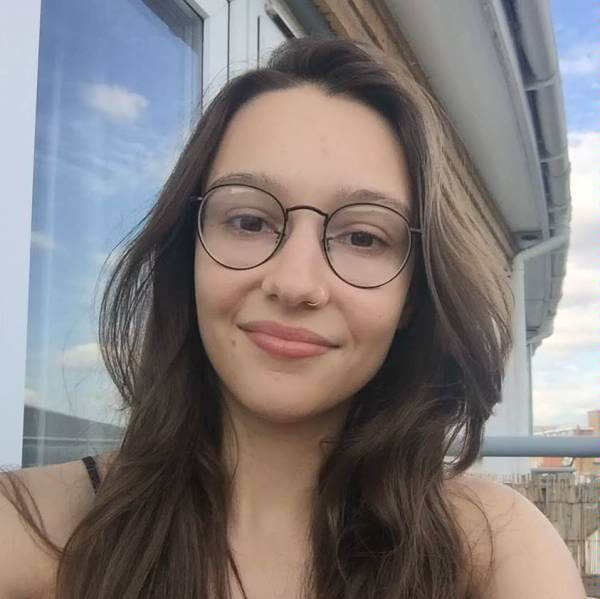
Dr Meredith Barr is a lecturer in Chemical & Energy Engineering at London South Bank University, having previously worked at Imperial College London. She obtained her PhD in Biomass Pyrolysis from Queen Mary University of London following her first degree in Chemical-Biological Engineering from MIT. Her research focuses on converting waste biomass to sustainable materials using ‘waste-negative parallel manufacturing’: the co-production of diverse materials from complementary fractions of biomass, with an emphasis on using more waste than is produced. Her current work related to biochars for pollution prevention includes developing biochar wastewater filters to combat the spread of antimicrobial resistance (AMR) in the environment, tuning biochar morphology for improved nutrient regulation, and refreshing spent biochar sorbents.
Latest news
See here for recent items on this topic, and for more news click on tag for Biochar WG
***A part-funded PhD studentship is available to carry forward work in EBNet POC202409 – contact Dr Barr for more details***
The YouTube video playlist for this WG is here.
The WG Activity report to March 2025 is available HERE
WG Activities
Joint workshop exploring the integration of conversion technologies
BBNet and EBNet supported this very successful workshop exploring how thermal, thermochemical, and biological conversion technologies may be integrated to improve environmental and economic outcomes of waste and biomass valorisation processes.
The two-day in-person event was led by the EBNet Biochars for pollution prevention WG co-ordinated by Dr Meredith Barr and brought together colleagues working across the environmental biotechnology and biomass biorefining sectors. The workshop covered the following topics:
- biological pretreatment of thermal/thermochemical feedstocks
- biochar for microbiome engineering
- thermal/thermochemical technologies in anaerobic digestion and fermentation
Each session was led by experts in the field including Prof Jhuma Sadhukhan, Dr Mark Gronnow and Dr Andrew Ross, and featured speakers sharing their research, including the motivation, methods and challenges associated with each pathway.
Workshop dates and venue: 25 & 26 February 2025, London South Bank University
The workshop activities are summarised here. A full report on outputs will be available soon.
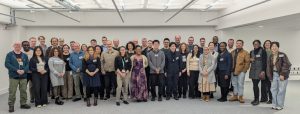
Conference attendance and inputs
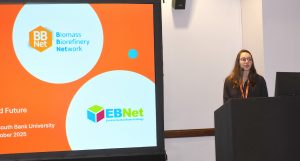 An invited talk on Integrating Thermal and Bio-Conversion and the Future of the EBNet Biochar Working Group was given at the 4th BBNet conference on The Future Prospects for Biorefining: Feedstocks, Technologies & Products held in Sheffield, UK on 15-17 Oct 2025 in Sheffield. A recorded version of the talk is available here.
An invited talk on Integrating Thermal and Bio-Conversion and the Future of the EBNet Biochar Working Group was given at the 4th BBNet conference on The Future Prospects for Biorefining: Feedstocks, Technologies & Products held in Sheffield, UK on 15-17 Oct 2025 in Sheffield. A recorded version of the talk is available here.
Dr Meredith Barr presented results on Linking bacterial absorption to local biochar morphology and production conditions by X-ray nanotomography at the 2025 Biochar IV conference: see here for details, HERE for the prentation on EBNet’s YouTube channel, and EBNet POC202409 for a project summary.
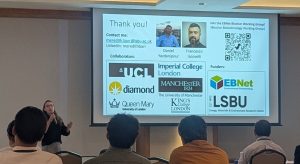
Contribution to the Workshop: Exploring The Past, Present and Futures of Environmental Biotechnology as a Field, 4 November 2024, London. Dr Meredith Barr gave a Response to the interim findings from the Social Science Working Group exploration of the field and explored some important and provocative questions about the future.
On behalf of the WG, Dr Szabolcs Papp attended the 29th European Biosolids & Bioresources Conference held on 19-20 Nov 2024 in Manchester to participate in sessions on biochar applications in the water industry: see here for his report.
Two members of the WG attended WasteEng24, 20-23 August 2024, Sendai, Japan. They presented work from 3 WG member with 2 presentations, a poster and a chaired session. See here for more details.
Lab Visit – Biochar research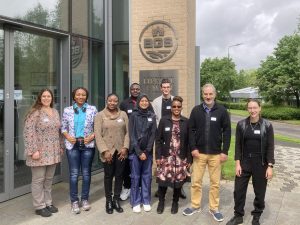
The Working Group arranged a lab visit to Heriot-Watt University on 24 May 2024, hosted by Prof Tony Gutierrez. There was a group tour of the facilities, and a meeting with others working with biochars. See here for more details of participants and activities.
Webinar
Watch our inaugural webinar which explores potential working group activities with excellent talks from Prof Fred Coulon, Cranfield University and Distinguished Prof Andy Ball, RMIT.
Outreach
Biochar, AD and Digestate, by Lidia Krzynowek and David Vaughan, EB Network Corner, AD & Bioresources News, Issue 57, Summer 2024, extracted here.
EBNet POC funding
EBNet funded the followinh Proof-of-Concept (POC) projects in this area:
Elucidating mechanisms of bacterial adsorption to biochar by 3D X-ray image analysis EBNet POC202409 Dr Meredith Barr, London South Bank Univeristy
Bio-engineering of biochar for enhanced remediation of contaminated land EBNet POC202008 Prof Tomy Gutierrez, Heriot-Watt University
Relevant Publications
New directions and challenges in engineering biologically-enhanced biochar for biological water treatment. Anjali Jayakumar et al., Science of the Total Environment, Volume 796, July 2021, 148977.
Biochar-based wastewater treatment to combat antimicrobial resistance. Paul-Enguerrand Fady et al. (2022), XII Iberoamerican Congress on Pulp and Paper Research. Girona, Spain 28 Jun – 01 Jul 2022 https://doi.org/10256/21215
Biochar-microorganism interactions for organic pollutant remediation: Challenges and perspectives. Santanu Mukherjee et al., Environmental Pollution. Volume 308, 1 September 2022, 119609
Bioengineering remediation of former industrial sites contaminated with chemical mixtures. Emmanuel Atai et al., Journal of Hazardous Materials Advances. Volume 10, May 2023, 100319
Recent advances in biochar engineering for soil contaminated with complex chemical mixtures: Remediation strategies and future perspectives. Jerry Anae et al., Science of The Total Environment. Volume 767, May 2021, 144351
Biochar application in biofiltration systems to remove nutrients, pathogens, and pharmaceutical and personal care products from wastewater. Zahra Maleki Shahraki and Xinwei Mao, Journal of Environmental Quality. Volume 51, March/April 2022, 129-151
Biosolids-derived biochar enhances the bioremediation of diesel-contaminated soil. Charled Chinyere Dike et al., Journal of Environmental Chemical Engineering. Volume 10, December 2022, 108633
Biochar filters as an on-farm treatment to reduce pathogens when irrigating with wastewater-polluted sources. Luis Fernando Perez-Mercado et al., Journal of Environmental Management. Volume 248, October 2019, 109295


